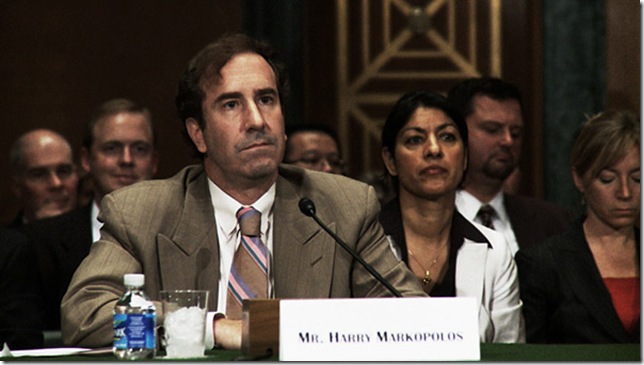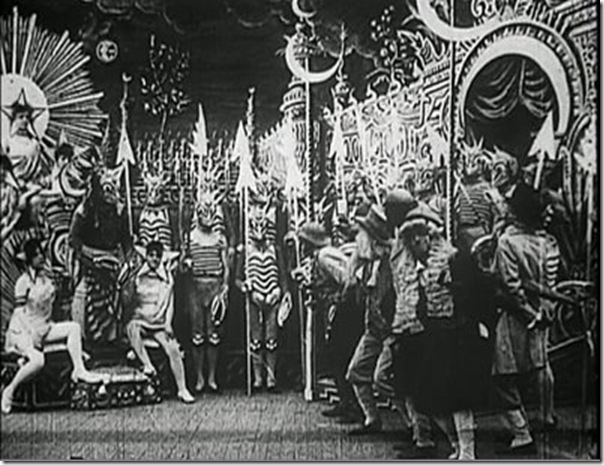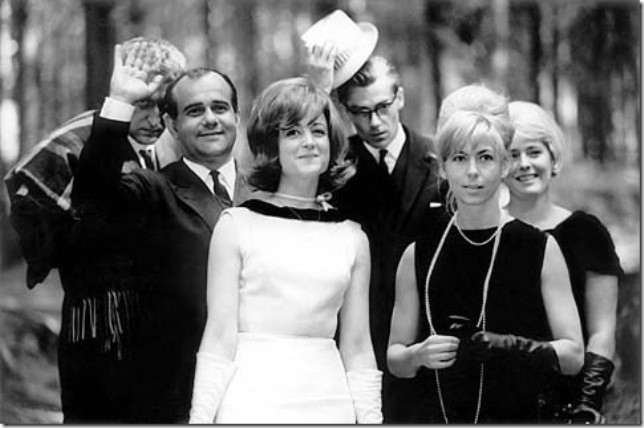As the axiom goes, you’re not paranoid if they really are out to get you. During his quest, which began in 2000, to urge the SEC to investigate Bernard Madoff’s Ponzi scheme, Harry Markopolos was indeed a paranoid man.
Toppling one of the kingpins of Wall Street is not an enviable job, Markopolos suggests in Chasing Madoff (MPI, $24.99 Blu-ray, $22.99 DVD), the recently released documentary about his eight-year mission. In the film, we hear that Markopolos, then a CIO with a Boston-based options trader, obtained a handgun from the local authorities, packing “heavy” whenever he nosed around Wall Street types. He eventually added a bulletproof vest to his protective accoutrements, and in dramatic reenactments, we see him practicing his aim at a shooting range and checking under his car for bombs, a daily ritual.
This all makes for an entertaining movie, but was it all necessary for Markopolos’ survival? Were they really out to get him? This is unclear, and the thin, vague and unsubstantiated claim that other whistleblowers were murdered – sometime, somewhere – does nothing to justify its protagonist’s extreme measures. Markopolos, who looks like a rumpled, less chiseled Jon Hamm, says some other strange things as well: “I was way too young to get married,” he asserts. “I was only 42.”
At any rate, suggestions of poison in Markopolos’ food, a home invasion from Madoff’s cronies or the presence of bullets whizzing into his windows at any time – despite no evidence supporting them – are just a few of the ways director Jeff Prosserman attempts to sexify a movie about a glacial fraud investigation. Based on this, his first feature-length movie, Prosserman is simply an efficient mimic of the American documentary form, aping the styles of Errol Morris and James Marsh even when they aren’t appropriate. Set against a black backdrop, Markopolos and his four investigative associates speak to the camera as if interrogated (a Morris innovation that he should have copyrighted).
There are visions of raining dollar bills set aflame, and the sound of an explosion thunders across the soundtrack when Markopolos starts his car. Walking his two young boys through the woods, Markopolos engages in a laughably metaphoric discussion of “predators” and “prey” in the dog-eat-dog forest – a moment so staged there might as well have been directional marks on the ground and a curtain dropping from the trees.
This kind of middling, untrustworthy, suspense-movie melodrama only undercuts the powerful relevance of the film’s core: That for 10 years, despite mounting evidence by an intrepid investigator and a number of published articles spurred on by that investigator, the Securities and Exchange Commission did nothing to prevent a transparent Ponzi scheme that robbed investors of an unprecedented $50 billion. If anything, Madoff comes off as a cunning but prototypical Wall Street shark – a capitalist doing what capitalists do, to a criminal extreme – with Prosserman and Markopolos reserving the bulk of their ire for the SEC. The film’s most effective passages are the C-SPAN clips in which congressional representatives blast the hapless SEC chiefs for their negligence.
Thus, I left the movie admiring Markopolos’ admirable relentlessness but dismissing the movie’s hyperventilated style. Where is Alex Gibney (Casino Jack and the United States of Money) when you need him?
DVD Watch
April 10: Fueled, now doubt, by the popularity and critical acclaim of Martin Scorsese’s Hugo, Flicker Alley is releasing the best edition yet of the masterpiece by that film’s subject, George Melies. A Trip to the Moon (Blu-ray, $35.99) has been released countless times previously, by every distributor under the sun. But this time, finally, you’ll be able to see it in its original 1902 color tinting. This winner of the 2011 Best Film Restoration Award includes a new score by ambient music icons Air and a new feature-length documentary about the making of the film called Extraordinary Voyage. It chronicles the film’s original production, influence, rediscovery and ultimate canonization. This lavishly packaged edition is a must for everyone’s home-video collection.
I’m also looking forward to From the Other Side (Icarus, $34.98), the latest from experimental Belgian auteur Chantal Akerman. This time, the feminist film titan turns away from art-house narratives and into the powerful waters of political polemic: From the Other Side is a poetic study of the reality of modern immigration in America, with Akerman interviewing penurious Mexicans in south-of-the-border towns as well as lawmen in a neighboring Arizona city, where illegal immigration is common. The result is, per the Chicago Reader, a mix of “sensitive portraiture and investigative journalism.” Also of note this week: King of Devil’s Island (Film Movement, $24.95), a chilling historical drama from Norway set in a tyrannical boys’ school; and Elia Kazan’s essential A Streetcar Named Desire, making its debut on Blu-ray (Warner, $23.99).
April 17: British actor David Hemmings, a matinee idol in Swinging London, performed in more than 100 titles until his 2003 death, most notably as the photographer in Michelangelo Antonioni’s Blow-Up and in his supporting roles in Gladiator and Gangs of New York. He’s much less recognized as a director, where he worked mostly in television. But he also helmed the 1981 feature The Survivor (Scorpion, $17.99) a cult horror classic about a pilot who realizes he’s the lone survivor of the crash of a massive 747 jetliner. He is eventually joined by a psychic, who helps him piece together what happened – and why he survived. Joseph Cotten costars in the film, which was based on a best-selling novel by James Herbert.
This week also marks the Blu-ray debut of Late Spring (Criterion, $29.99), one of the many contemplative postwar masterpieces about domestic life from Japan’s Yasujiro Ozu. If you’ve seen a lot of Ozu films, his body of work is so consistent that you may not remember which is which; this is the one about a daughter’s enduring commitment to her widowed father, at the expense of her personal life. For a film that’s a little more, well … louder, check out Pixar virtuoso Brad Bird’s surprisingly well received live-action debut, Mission: Impossible – Ghost Protocol (Paramount, $21.99 Blu-ray, $15.49 DVD).
April 24: My favorite release of the whole month is Pearls of the Czech New Wave (Criterion Eclipse, $51.99), a mammoth new box that compiles six underrated classics from a country that contributed greatly to the merger of narrative and experimental film in the 1960s. If the French New Wave had its Chabrol, Godard, Truffaut, Rohmer and Rivette, then Czech cinema in the same period had its own Věra Chytilová, Jaromil Jireš, Jiří Menzel, Jan Němec and Evald Schorm, boundary-pushing voices that created a filmic manifesto out of a nascent industry.
This box set includes Pearls of the Deep, a landmark omnibus film with segments directed by each of these filmmakers, along with a full-length feature from each of them: the feminist classic Daisies, the surrealist fable A Report on the Party and Guests, the psychological drama Return of the Prodigal Son, the offbeat comedy Capricious Summer and the political satire The Joke.
Also on tap for this week is another winner from Criterion, Mario Monicelli’s The Organizer ($20.99 Blu-ray, $17.99 DVD), a tale about a workers’ uprising that sounds inspiring amid today’s routine attacks on organized labor. Elsewhere, don’t miss the neglected Edward G. Robinson film noir The Red House (HD Cinema Classics, Blu-ray and DVD combo pack, $11.99), available on a quality transfer for the first time.



